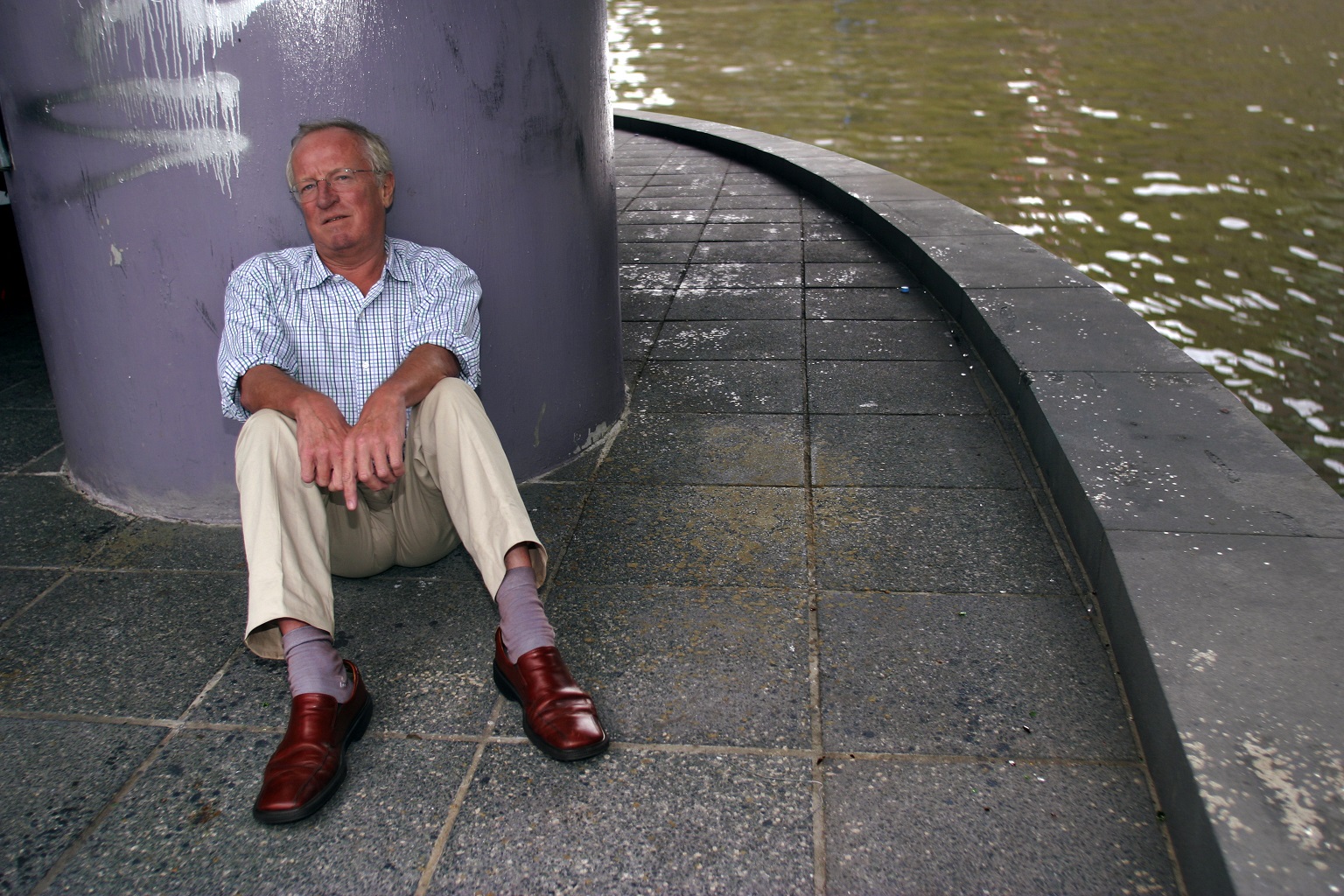كان روبرت فيسك يبلغ الثانية عشرة من العمر عندما شاهد فيلم "المراسل الأجنبي" (1940) لألفريد هيتشكوك. لاحظ فيسك أن المخرج البريطاني لم يقدم جون جونز (المراسل الذي لعب دوره الممثل جويل ماكري) على أنه مجرد صحفي، بل ذلك البطل الذي تمكن بصدق من تغيير الأشياء وكشف الحقائق من خلال عمله. في تلك اللحظة، أدرك فيسك ما يريده من حياته: أن يقول الحقيقة.
وقع في حب مهنته وكرس نفسه للصحافة، وأصبح أحد أشهر الصحفيين ومراسلي الحرب. وبما أنّ "الحقيقة هي دائما الضحية الأولى" كما يقول المثل، كافح فيسك طوال حياته لفضح الحقيقة في مناطق الصراع. وفي سعيه الدؤوب لقول الحقيقة وتصميمه على قول ما لا يجرؤ الآخرون على قوله، أعطى فيسك للضعيف وللضحايا صوتًا.
وفي عصر الأخبار الكاذبة، تحولت مهمة فيسك في توثيق الواقع إلى معركة الاستحواذ على الحقيقة. "هذا ليس فيلمًا" (2019) ليونغ تشانغ يعرّفنا -عن قرب- على رؤية وحياة روبرت فيسك. المخرج الكندي الصيني رافق فيسك البالغ من العمر وقتها 73 عاما (قبل وفاته في أكتوبر/تشرين الأول 2020) في عمله، وعرض تسجيلات لأفلام وأبحاث وتقارير سابقة عن الرجل الذي شُتمَ مرارًا وتكرارًا باعتباره داعية وأداة لقوى الظلام و"عدوّ الشعب". يرافق الوثائقي فيسك في بحثه عن الحقيقة خلال إعداده لعدة مقالات.. يلاحظ كيف يتحرك الصحفي المتمرس في مناطق الأزمات وتفاعله مع الناس.
"هذا ليس فيلمًا" سيرة ذاتية، ونداء للصحافة الملتزمة والمهنية.. فيلمٌ يلتقط مسار فيسك المهني وانعكاساته على الصحافة والصحفيين على مدى أربعين عامًا من تاريخ العالم.
روبرت فيسك ليس الصحفي النموذجي.. مهمته الأولى كصحفي كانت في بلفاست، في خضم نزاع إيرلندا الشمالية، حين أدرك أن الجيش البريطاني لا يحتكر وحده الحقيقة، وهو اكتشاف جعله على الفور شخصية مثيرة للجدل في بلاده. قدّم تقريرا عن ثورة القرنفل في البرتغال، وبعد ذلك بوقت قصير، ذهب -لأول مرة- إلى الشرق الأوسط. عاش في بيروت منذ العام 1976، يتحدث العربية ويقرؤها، وخصص نفسه لصراعات المنطقة. كان شاهدا على الحرب الأهلية اللبنانية، والثورة الإيرانية، والحرب العراقية، ومجزرة حماة، وحرب الخليج الأولى، وغزو العراق، ومذبحة قطاع غزة. كان واحدًا من المراسلين الأجانب القلائل الذين كتبوا عن مجزرة صبرا وشاتيلا، وكان أول مراسل غربي من دوما السورية بعد استخدام الغاز السام عام 2018. كتب عن تجارة الأسلحة غير المشروعة، وعن سياسة الاستيطان الإسرائيلية. قصصه نادرًا ما تتطابق مع ما تنشره الحكومات الغربية كحقائق موثوقة حول هذه البلدان. كان دائما مؤمنا بمبدأين لا غنى عنهما للعثور على الحقيقة: "إذا لم تذهب إلى أي مكان وتشاهد ما يحدث بأم عينيك، فلا يمكنك الاقتراب من الحقيقة"، و"عليك دائما أن تستجوب السلطات".
"بدأتُ أتساءل: لماذا مارستُ الصحافة في الأصل؟"، يقولها روبرت فيسك في الفيلم، في لقطة من فيديو أرشيفي يعود إلى أوائل الثمانينيات. التصريح مؤلم بعض الشيء، ولكنه مناسب جدا للفيلم. قدم تشانغ فيلمًا يدعو للتفكير في حدود الحرب وجدواها. هناك الكثير من الصور والمشاهد الجذابة. ولكن، بدلا من اقتصاره على تجارب فيسك العديدة التي لا يمكن إحصاؤها في الشرق الأوسط، يعتمد الفيلم بشكل منطقي على محاور موضوعية عن معنى الحرب، أو بالأحرى عن عبثيتها.
في الأحاديث التي سُجّلَت في شقته بالعاصمة بيروت، يقدم الفيلم نظرة ثاقبة عن جوهر عمل فيسك، ثم نراه في العمل، في الأزقة المظلمة وبيده المفكرة والقلم، يسجل ما يراه.. يتحدث إلى المحللين. نتابع فيسك في أماكن مختلفة، منزله في بيروت، على الجبهة السورية، في مخيمات اللاجئين، وفي صبرا وشاتيلا.. مثال حي ورئيسي لمراسل وصحفي من المدرسة القديمة يقوم بالأشياء الصعبة. هذه الصحافة الجيدة و"القديمة" أصبحت الآن أكثر أهمية من أي وقت مضى بسبب الإنترنت. في الوقت نفسه، لا يحظى هذا النوع من الصحافة باحترام كبير من قبل أباطرة وسائل الإعلام الذين يهتمون فقط بالأرباح.
في الوثائقي، يخبرنا روبرت فيسك بضمير المتكلم عن تجاربه.. سمح له تفانيه في عمله والوقت الطويل الذي قضاه في الشرق الأوسط بأن يسرد لنا جميع أنواع القصص عن الحروب والحقائق والأكاذيب التي قيلت عن هذه المنطقة. يخبرنا فيسك هذه القصص بنفسه، ويستمدها من ذاكرته وملفاته وأوراقه.
"هذا ليس فيلمًا" يعتبر بمثابة سيرة، ورصد موثَّق لمسيرة فيسك المهنية. وكأنه -تقريبا- عرضٌ للفصول الشخصية من كتابه "الحرب الكبرى لأجل الحضارة" على شاشة. يروي فيه بشكل موجز ولكن دقيق، تاريخَ الحروب والصراعات في الشرق الأوسط خلال القرن العشرين من وجهة نظره وتجربته كصحفي.
من وجهة نظر سينمائية، لا يقدم الفيلم مشاهد رائعة أو مصورة بشكل فني جميل، بل صورا فوتوغرافية وتسجيلات أرشيفية أثناء المعارك أو الهجمات أو المذابح، تتيح للمشاهِد -ببساطة ووضوح وبالمعلومات والصور اللازمة للسياق- أن يتابع الأحداث وتسلسل أفكار فيسك.
لا يتحدث فيسك في الفيلم عن حياته الشخصية، لسبب واحد بسيط: إنها حياة خاصة. كانت هذه هي القاعدة التي اتبعها منذ أن غطى الصراع في إيرلندا الشمالية، لكن الوثائقي مليء بالوصايا للصحفيين. يوصي فيسك الصحفيين الذين يغطون الحرب لأول مرة بفتح أعينهم، يقول لهم: "إنها ليست هوليود.. هذا ليس فيلمًا.. يمكنهم قتلك.. إذا شاهدت أفلاما، مهما بدتْ دموية، فالأمر ليس كذلك.. كن حذرا وعقلانيا.. لا تجازف".
على الصحفيين -كما يقول فيسك- واجب ضمان عدم كتابة التاريخ من قبل السياسيين. ووفقًا له، من الغباء افتراض أن التقارير الصحفية لا ينبغي أن تتخذ موقفًا أخلاقيًّا، وأن المراسلين لا ينبغي لهم -على الأقل- تحدي رواية القوي والمنتصر، التي -في العموم- تنطوي على تشويه للحقيقة. بالنسبة له، ليس مناسبًا أن يقوم الصحفي بتسجيل محايد للأحداث في حالة الصراع، دون مراعاة التاريخ أو تفاوت القوة بين المظلوم والظالم. يجادل بأن الحجة القائلة بوجوب تضمين آراء مالك العبيد بشأن تجارة الرقيق في قصة لجعلها عادلة ودقيقة؛ أمر سخيف من الناحية الأخلاقية. "إن الفكرة القديمة القائلة بأن الصحافة يجب أن تكون محايدة وألا تنحاز إلى أي جانب، هي مجرد هراء. كصحفي، شعوري هو أنه يجب أن تكون محايدًا وغير متحيز، ولكن محايدًا من جانب أولئك الذين يعانون"، يقول للكاميرا. ويضيف "أنا لست آلة" لأولئك الذين يتبنون أسطورة الحياد التام.
لأن روبرت فيسك ليس مراسلا عاديًّا فهو صاحب مدرسة خاصة في العمل الميداني الصحفي، لا يظهر في مشهد ويكتب قصة إخبارية ويعود إلى منزله. يعيش فيسك في المكان، هو غارق فيما يحدث، ومن خط يده تأتي تجارب حقيقية، تصبح حقائق مؤلمة.
الفيلم انحناءة احترام من المخرج لفيسك، لكنه أيضا دعوة للصحفيين إلى تأمل حالة الاحتضار التي تغرق فيها الصحافة حاليا، ومن خلفها الإنسان بشكل عام.. هو دعوة لبحث العلاقة المعقدة بين الصحافة والحقيقة.
يظهر فيسك في هذا الفيلم غاضبا أكثر من ذي قبل، لأنه أدرك أن عبارة "الأخيار هم من يفوزون" ليست سوى أسطورة. هو الذي لطالما آمن بأنّ احترام المصادر والحقائق المباشرة يعني ضرورة قول الحقيقة دائمًا، بالإضافة إلى امتلاك الشجاعة لمراقبة وتحدي مراكز القوة بغض النظر عن مدى عدم شعبيتها. هو الذي لديه تاريخ طويل من التقارير قدمها من الخطوط الأمامية للصراعات، وتاريخ أطول في معارضة الخط الرسمي للسلطة السياسية في الغرب. لذلك، دائما ما كانت تُحذف جمل من تقاريره أو يُلغى أو يُحرّف مقال من مقالاته. وعن ذلك يقول: "إذا خاطر الصحفيون بحياتهم لقول الحقيقة، فيجب على المحررين أن يكونوا شجعانًا بما يكفي لطباعتها".








































